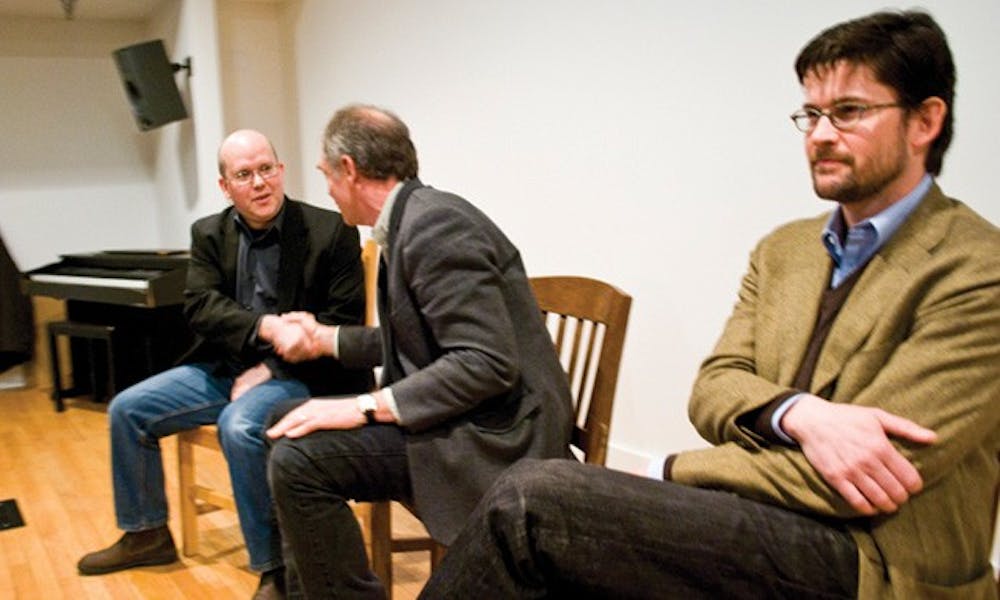When someone throws around the term “documentary,” chances are the following word will be “film,” maybe “radio” if the conversation concerns public radio programming. But because of the efforts of Duke’s Center for Documentary Studies, including this month’s Documentary Speakers Series, the phrase “documentary writing” should soon look far more familiar.
The series—which began on March 5 with a lecture from Roger Hodge, the recently dismissed editor of Harper’s Magazine—sheds light on the current practitioners of long-form journalism: the 3,000-word-and-longer features that usually end in the back pages of a magazine, boxed text introduced with a curt “continued from page 45.” In addition to Hodge, medical ethics writer Rebecca Skloot will be speaking on March 24 in collaboration with the Sanford School of Public Policy, and journalist/fiction author Wells Tower will be appearing on April 23 to talk about the interplay between non-fiction and fiction. Tower was initially slated to come to CDS this Friday, but his appearance had to be rescheduled.
CDS Director Tom Rankin broke down the series as a zeroing in on the nature of documentary writing, from macro to micro.
“Roger comes from the editorial angle and has been hiring people like Wells, so in a way Roger has been flying at 30,000 feet when he’s working at Harper’s—he’s been seeing the big picture,” Rankin said. “Wells on the other hand is an active writer and going out and doing pieces and he’s also writing fiction. So with Wells, I think one of the interesting things you get is this: where is the line between non-fiction and fiction, where is the line between the personal/subjective and the more cultural/objective.”
Skloot brings a more intensely focused perspective. Her recently released book, entitled The Immortal Life of Henrietta Lacks, is a product of 10 years researching one subject and an authorial fascination that can be traced back to high school.
“While [Skloot] is talking about something historical, it’s relevant to the here and now,” Rankin said. “That’s something that documentary is often about: taking some particular story that might’ve happened in the past and bringing it into the present and making it part of the conversation about, in this case, current issues in medicine and ethics.”
In a time of shrinking magazines and an endangered newspaper industry—a topic that comprised the bulk of Hodge’s lecture—CDS’ programming demonstrates an alternative reaction. Although filmmaking and radio programming in a documentary vein are household concepts, Rankin said the vague connotations of documentary writing have discouraged a similarly acute definition. He hopes the efforts of CDS can change that and allow for greater academic attention on the subject.
“I see it as going against the grain somewhat, but I also am a real believer that we’re in the midst of an evolution and not an eradication,” he said. “I do believe that really artful, relevant—both deeply personal and connected to larger issues—that kind of writing will have a place...”
This type of writing is what CDS seeks to promote with both the series and the class Documentary Writing, taught by CDS instructor Duncan Murrell. Murrell’s course covers the top long-form writers working today and helps students complete their own documentary piece, some of which, Murrell said, turn out to be of professional quality. The lecture series was actually a brainchild of Murrell’s, and the featured individuals visit his class in addition to the public events.
The stories that students end up with are in the 5,000 word range, Murrell said, and the course prepares them for the tasks of developing and refining ideas, establishing sources, going out and doing the research and finally writing the story. Several of the students are pursuing documentary studies certificates but come from the video or audio aspects, and the class gives them the opportunity to diversify as documentarians.
“Let’s just say you’re training journalists.... These days, if you’re not able to tell a story in a variety of media and also have a network to find the best place to put that story, you’re really at a disadvantage,” Murrell said. “Teaching a greater variety of skills, and not just writing, and not just film, and not just audio, is pretty smart preparation.”
Murrell works to instill in the students a respect for deadlines and a sense of discipline in advancing their work, something that’s useful for a student in any field—but especially journalists. He functions as the class’ editor, an area in which he gained experience after working for Algonquin Books in Chapel Hill. And the students get a look at journalistic opinions from across the spectrum, including the optimistic—like Skloot, whose book is a bestseller—and the pessimistic—like Hodge, who recently lost his editorship.
Along with the academic and the extracurricular, Murrell and Rankin are looking at another way to advance the conversation on documentary writing: their own piece of journalism. Murrell is currently working on a proposal for a book-length study of the discipline, and the endeavor will be spearheaded by the Center’s publishing arm if it is approved. Such a work could provide the definition the practice now lacks, and some subsequent recognition.
“The vibe I pick up from [CDS] is very humane: we’ll let you tell your story, we’re going to spend the requisite time to build trust, and we’re going to get something a little bit deeper from people, from ordinary stories,” Murrell said. “I think that’s useful to think about as a writer.”
Get The Chronicle straight to your inbox
Signup for our weekly newsletter. Cancel at any time.

